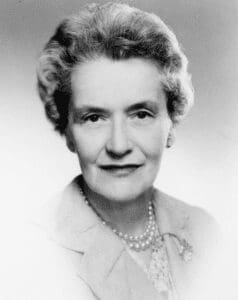The Case for Supporting Mental Health Nonprofits
Mental health care is essential, and we need all the advocates we can get. Now, you might be thinking, “But I’m not a therapist, a doctor, or even someone who knows a lot about mental health. How can I be an advocate?” Well, fear not, because being a mental health advocate does not require any special qualifications. All you need is a willingness to listen, support, and be there for those struggling with their mental health. Whether you are a parent, a student, a barista, or even a professional knitter (hey, we don’t judge), here’s how you can make a difference in the lives of those who are affected by mental illness by supporting mental health nonprofit organizations such as the Council for Relationships (CFR).

Emily Mudd (pictured here) founded the Council for Relationships in 1932.
A nonprofit since 1932
Advocating for mental health not only means knowing where to access care, but it also helps to support the organizations that are changing lives daily. CFR serves a diverse client population in a dynamic environment that attracts top experts, including psychologists, licensed master’s level clinicians, and medical psychiatrists.
What you may not know is CFR is a nonprofit organization that provides sliding scale fee, low fee, and no fee therapeutic services to clients who would otherwise be unable to afford mental health services. However, CFR generates 90% of its operating budget through earned revenue from clients paying the market rate and sliding scale fees for counseling services and clinical education tuition. The organization must raise the remaining 10% of its operating budget from donations. Contributed revenue supports mental health services for those who cannot afford market-rate fees, as well as supports our community outreach.
Bridging the mental health care access gap
The average therapy session cost is $140, whereas low-fee therapy sessions range from $15 to $45. With over 25% of CFR clients receiving low or no-fee therapy services, CFR must raise private funding to compensate for the gap in direct costs for therapeutic services and fulfill our mission of providing unparalleled therapy for all, regardless of ability to pay.
This is where you come in, friends.
- Help those in need: Donating to CFR provides direct support and resources to individuals struggling with mental health issues. Your donation funds individual, relationship, and family therapy as well as medication management and other treatments that can make a difference in someone’s life.
- Break the stigma: Mental health is still a taboo subject for many people, and there is often a lack of understanding and support in society. Donating to CFR breaks the stigma and raises awareness about the importance of mental health through our media advocacy plan.
- Support research: Donating to CFR funds research into the causes and treatments of mental health issues. This can lead to a better understanding of mental illness and more effective treatments in the future.
- Improve access to care: Many people with mental health issues struggle to access the care they need due to financial or logistical barriers. Donating to CFR improves access to care for those who need it most.
- Make a difference: By donating to CFR, you make a tangible difference in the lives of those affected by mental health issues. Your donation provides hope and support to struggling people and can help create a brighter future for your community members. Check out our 2022 Impact Report to learn more.

Dr. Susan Albers, Psy.D., is a New York Times best-selling author and a clinical psychologist who specializes in eating issues, weight loss, body image concerns, and mindfulness.
Do what’s best for your health by supporting mental health nonprofits
Being an advocate also comes with added physical and emotional benefits. According to Dr. Susan Albers at the Cleveland Clinic, giving is good for your health, and is scientifically proven to lower blood pressure, decrease stress, and help you live longer. How’s that for paying it forward and then receiving that good karma right back at you?
Every dollar counts. Whether it’s a small monthly recurring donation or a one-time gift every year, giving the gift of mental health has a multiplier effect on the individual and their families and friends. Learn more about all the ways to give to CFR and support your family, friends, and neighbors today.

Jason Anhorn, MEd (pictured here) joined CFR in August 2021.
About the Author
Jason Anhorn, MEd, CFRE is the Chief Advancement Officer at Council for Relationships. He has over 20 years of experience in higher education administration and nonprofit management. If you have questions about how your gift is changing lives or are interested in supporting CFR is a different way, you may reach him at janhorn@councilforrelationships.org or at (215) 382-6680 ext. 3155.
More from CFR
Philly Mayoral Candidate Helen Gym on the Mental Health Crisis
